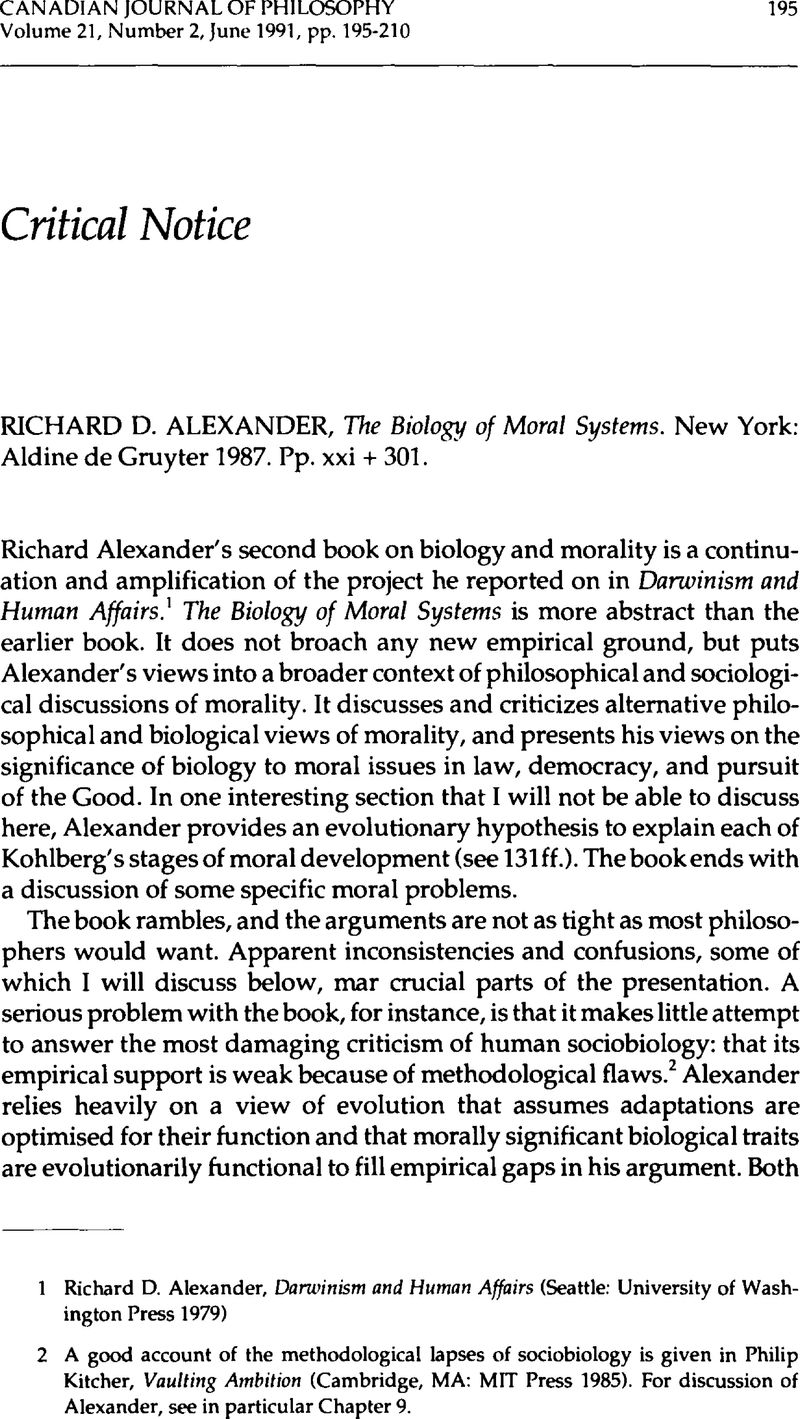Article contents
Richard D. Alexander The Biology of Moral Systems. New York: Aldine de Gruyter 1987. Pp. xxi + 301.
Review products
Published online by Cambridge University Press: 01 January 2020
Abstract

- Type
- Critical Notice
- Information
- Copyright
- Copyright © The Authors 1991
References
1 Alexander, Richard D. Darwinism and Human Affairs (Seattle: University of Washington Press 1979)Google Scholar
2 A good account of the methodological lapses of sociobiology is given in Kitcher, Philip Vaulting Ambition (Cambridge, MA: MIT Press 1985)Google Scholar. For discussion of Alexander, see in particular Chapter 9.
3 Even if Alexander is wrong about everything else, this is one thing he is definitely not mistaken about. See Bradie, Michael ‘The Implications of Evolutionary Biology for Ethics,’ in Weingartner, P. and Schunz, G. eds., Philosophy and Natural Science: Borderline Questions (Vienna: Kluwer Academic 1989), 13-16Google Scholar.
4 Wilson, E.O. On Human Nature (Cambridge, MA: Harvard University Press 1978)Google ScholarPubMed; Lumsden, C. and Wilson, E.O. Genes, Mind and Culture (Cambridge, MA: Harvard University Press 1981)Google Scholar; and Ruse, Michael Taking Darwin Seriously (Oxford: Basil Blackwell 1986)Google Scholar
5 Richards, Robert J. Darwin and the Emergence of Evolutionary Theories of Mind and Behavior (Chicago, IL: University of Chicago Press 1986)Google Scholar, Appendix 2; Richards, Robert J. ‘A Defense of Evolutionary Ethics,’ Biology and Philosophy 1 (1986) 265-93Google Scholar
6 The use of ‘genes’ here is problematic. Gene tokens are possessed by one organism alone.1nterests are not directed towards gene types, however, since reproductive effort requires some historical connection, whereas two genes may be of the same type without any such connection. We can say for our purposes here that two organisms share the same gene if they share the same gene type, and there is a reproductive connection between the gene tokens.
7 Trivers, R.L. ‘The Evolution of Reciprocal Altruism,’ Quarterly Review of Biology 46 (1971) 35-7CrossRefGoogle Scholar
8 I have Williams’, Mary axioms (‘Deducing the Consequences of Evolution: A Mathematical Model,’ Journal of Theoretical Biology 29 [1970]343-85)CrossRefGoogle Scholar in mind specifically. Though this axiomatization has some flaws, it is the best available, and captures most of the content of less formal versions.
9 Wilson, E.O. On Human Nature (Cambridge, MA: Harvard University Press 1978), 19Google ScholarPubMed
10 Capacities are directly selected for, but their function is gene survival, which is only mediately selected. Whether gene survival causes the capacity or the capacity causes gene survival is a bit difficult to unravel. Bradie (‘The Implications of Evolutionary Biology for Ethics’) argues that gene survival is merely a by-product of selection for capacities, and hence the interests of the genes cannot be paramount. Gene survival, however, is more than a by-product oi the process; without it the process would not occur.
11 Alexander certainly recognizes that not all traits have been selected for (46ff.). He also recognizes that circumstances will alter how genetically determined traits are expressed; this is essential for his explanation of moral systems.
12 Taking Darwin Seriously, 253
13 Bradie, ‘The Implications of Evolutionary Biology for Ethics’
- 3
- Cited by




